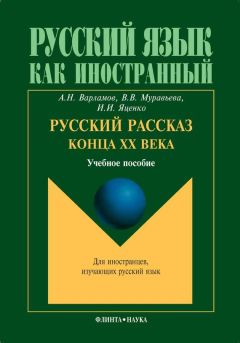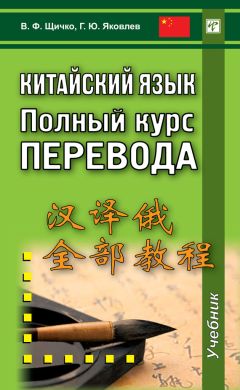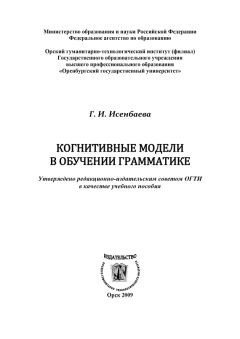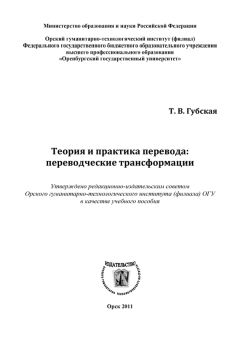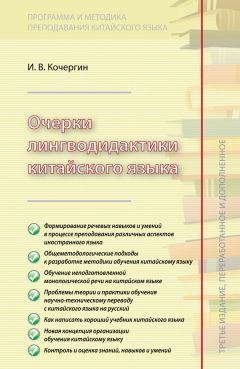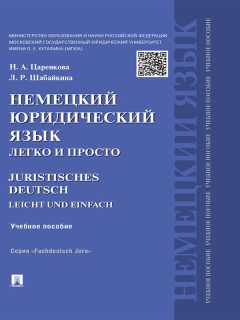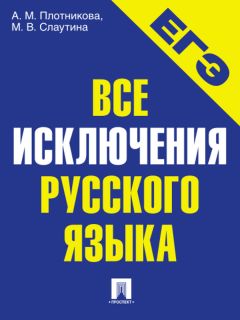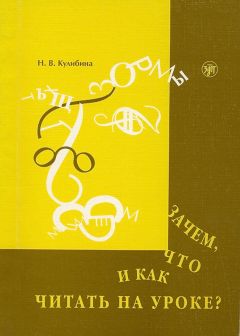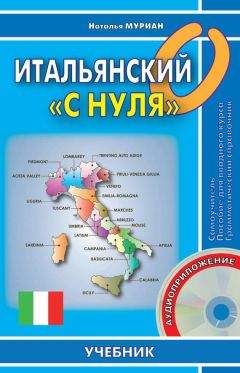Коллектив авторов - Молодежь о проблемах изучения иностранных языков в современном мире
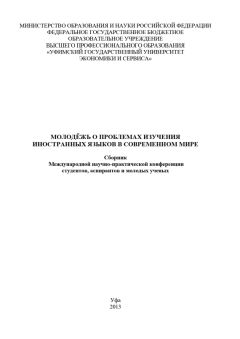
Все авторские права соблюдены. Напишите нам, если Вы не согласны.
Описание книги "Молодежь о проблемах изучения иностранных языков в современном мире"
Описание и краткое содержание "Молодежь о проблемах изучения иностранных языков в современном мире" читать бесплатно онлайн.
В сборнике представлены материалы научно-практической конференции, состоявшейся в УГУЭС 25 ноября 2013 года.
1. Nataly Kelly, Jost Zetzsche « Found in Translation: How Language Shapes Our Lives and Transforms the World»
2. http://www.7brands.com/translation-articles/target-language/englishtranslation/english.htm
3. http://www.lifescript.com/soul/self/growth/intercultural_communication_su rviving_in_a_global_world.aspx
THE ROLE OF THE ENGLISH LANGUAGE IN INTERCULTURAL DIALOGUE
УДК 81’24
DMITRIEVA D.
Bashkir State University (Ufa)
The English language has become widely spread now. It is one of the world's most important languages. it is an international language, the language of progressive science and engineering. We may say that English now is number one in the world, second only to Chinese.
Great Britain, the USA, Canada, Australia and New Zealand are regarded as English-speaking countries. Though the customs, traditions and the ways of life in these countries are quite different, they have owed common language – English it is the language of their ancestors who once left their homeland and sailed across the oceans in search of a new life and happy future.
Those who like foreign languages as well as teaching may enter the Linguistic University and become a teacher of one or two foreign languages – English, German, French, Spanish or Italian. Some graduates may work as teachers at schools or Institutes, others – as interpreters, translations, publishers, public relations agents.
A more general aim to learn foreign languages is to make our intellectual and cultural horizons wider through reading foreign authors in the original and through contacts with people of another culture. Languages study is an important key to understanding other peoples’ cultures.
As any other languages, English is a manifestation of culture. With the help of the English language one can acquire cultural background information and increase the knowledge about English-speaking countries and the people who live there, about their customs and traditions.
A foreign language is absolutely necessary for those who work in any branch of science. If you want to know much about the world’s famous scientific research information, you need command of a foreign language. And first of all you need English, because it is the language of most scientific books and magazines.
Nowadays English is becoming the language for practical usage. It is spoken in business. English is widely spoken at international conferences and also by those who travel in Europe, Asia, Africa and even in South America.
Nowadays, above 350 million people speak English as their native language. About the same number use it as a second language. English is spoken by no less than 50 per cent people on the Earth.
As for me I am absolutely sure that every educated and cultural person should know at least one or two foreign languages. There are many reasons for people to learn foreign languages. One of the main reasons is the need to communicate orally or in writing with other people who use this language. You may communicate with them over the Internet or mail if they are far away. When you listen to tapes, radio, watch videos and read a book or newspaper in a foreign language, it also means that you communicate. It is because you understand not only the words but thoughts and ideas of other people and you are ready to express your own thoughts in reply.
LEXICAL CORRESPONDENCES
УДК 81’373.46-021.161=111
DOLZHENKO K.
Ufa State University of Economics and Service (Ufa)
The study of the language is arguably the most hotly contested property in the academic realm. That is why linguistics compares languages and explores their histories, in order to find and to account for its development and origins to give the answers to this or that language point. Due to the semantic features of language the meanings of words, their ability to combine with other words, their usage, the “place” they hold in the lexical system of a language do not concur for the most part. All the same “ideas” expressed by words coincide in most cases, though the means of expression differ [1]. Lexical correspondences are such words and phraseological units in the target language which can be used instead of definite words and phraseological units in the source language. The term “lexical correspondence” should be differentiated from the term “lexical correlation” (correlated words). Speaking about lexical correspondence we mean words in one, target language. Lexical correspondences are usually fixed in dictionaries, that’s why thy may be also called dictionary correspondences. The principal types of lexical correspondences between two languages are as follows:
1) Complete correspondences;
2) Partial correspondences;
3) The absence of correspondences.
Complete correspondences of lexical units of two languages can rarely be found. As a rule they belong to the following lexical groups.
1. Proper names and geographical denominations;
2. Scientific and technical terms / with the exception of terminological polysemy/;
3. The months and days of the week, numerals.
While translating the lexical units partial correspondences mostly occur. That happens when a word in the language of the original conforms to several equivalents in the language it is translated into. The reasons of these facts are the following.
1. Most words in a language are polysemantic, and the system of word – meaning in one language does not concur with the same system in another language completely.
2. The specification of synonymous order which pertain the selection of words.
3. Each word effects the meaning of the object it designates.
4. The differences of semantic content of the equivalent words in two languages.
5. Each language has its own typical rules of combinability.
6. Most difficulties are encountered when translating the so called pseudo – international words i.e. words which are similar in form in both languages, but differ in meaning or use.
The Absence of correspondences, or realie words are denoting objects, phenomena and so on, which are typical of a people. In order to render correctly the designation of objects referred to in the original and image associated with them it is necessary to know the tenor of life epoch and specific features of the country depicted in the original work.
The following groups of words can be regarded as having no equivalents:
realiae of everyday life – words denoting objects, phenomena etc., which typical of a people;
proper names and geographical denominations;
addresses and greetings;
the titles of journals, magazines and newspapers;
weights, linear measures etc.
When dealing with realiae it is necessary to take special account of the pragmatic aspect of the translation, because the «knowledge gained by experience» of the participants of the communicative act turns out to be different [2].
References1. Curme G.O. English Grammar. – N.Y., 2003, p. 251.
2. Мухина Н.Б. Учебно-методический комплекс по курсу «Теория и практика перевода». 2011.
LANGUAGE UNIVERSALS
УДК 81’16-027.511=111
ELAEVA E.
Ufa State University of Economics and Service (Ufa)
Language is not only unique to humans and diverse but there are also common features between languages. About five thousand languages are spoken in the world today but there is a basic unity that underlies their diversities. Many of the world’s languages show similar principles. 'Language universals' are a set of principles which describe systematic patterns in languages – in other words they describe what the world's languages have in common. These language universals classify entire languages into categories which are then based on shared properties. There exist three approaches to explaining universals. These are namely the monogenesis, the innateness including other psychological explanations and the functional and pragmatic explanations. The term monogenesis means that there is a genetic origin which holds true for all languages of the world. The hypothesis is that there once existed and ancestor language from which all the languages of the world developed. This would also implicate that each of the universals have been part of the ancestor language and that they have passed on through all the stages the language went through. Authorities who speak about innateness are simply arguing that in the absence of any alternative coherent explanation for language universals, innateness is the only possibility that can be. Instead of serving to deepen our understanding of language universals, the absence of any possibility of testing innateness as an explanation serves rather to divert researchers from considering alternatives that may be testable [1]. The last approach is the one of the functional and pragmatic explanations. The argument concerning this approach is that through certain universals language becomes more functional. This contradicts the numerous instances where language seems to be dysfunctional. “The existence of synonyms seems to be a needless luxury and even more clearly the existence of homonyms…” [2].
There are so many linguistic features which the languages of the world share. Some are basic, such as the notion of ‘sentence’ or ‘verb,’ some are complex, such as Wh- movement. The rules which all languages have in common, with either very few, or no exceptions are called absolute universals. Let’s consider the following statements.
• All languages are equipped with the grammatical structures needed to give orders, negate a thought, and ask a question.
• All languages use verbs which reflect the past, present, or future.
• All languages possess a finite set of phonemes (sounds) including vowels and consonants which are strung together to form words.
• All languages share the basic categories of words, such as nouns, verbs, description words, relative clauses, and a method for counting.
• All languages use pronouns.
• All languages include any blend of or subcategory of the basis five colors: red, blue, yellow, black and white. The colors which are included in every language are red, white, and black [3].
To sum up, we must say that Language Universals are unique in starting with the assumption that the best way to approach these and related questions is through a dialogue between a wide range of disciplines, including linguistics, cognitive neuroscience, philosophy, computer science and biology.
References1. Comrie 1981: 24. The languages of the Soviet Union
2. Comrie 1981: 25. The languages of the Soviet Union
3. Chomsky, N. (1988). Language and problems of knowledge. Cambridge, Massachusetts: MIT Press
MYSTERY AND DIFFICULTY OF TRANSLATION
УДК 81’25=111
FAZYLOV A.
Ufa State University of Economics and Service (Ufa)
Even a professional translator is faced a number of objective difficulties that have to be considered. Many people believe that translation as transfer of words one language into another language cannot be precise and good. There are many reasons for that [1]:
1) The discrepancy between material objects or their verbal expressions. In general, the reality in which we live is different from the one in which speakers of others language live;
2) The discrepancy between a number of meanings of the same words in different languages;
3) Different collocability and idiomatic expressions;
4) The un-translatable dialect words and jargon;
5) Untranslatable realiae.
Meanwhile, the translation hide a few pitfalls. Among them are false friends of a translator. They are words similar in sound and spelling to the words of the target language, but very different in meaning. Once of perfume company Clairol introduced in Germany its deodorants, using Slogan “Mist Stick”. It turned out that the German word “Mist” is slang for “manure”.
Significant challenges for the translator are also the proper names. For example, the Russian name of the U.S. state of Texas is –Техас- is neither a translation (otherwise it would be “Тексас”), nor transcription (“Тэксес”). It is a historical form of translation.
Moreover, the translation in general, and in the translation of proper names in particular, we are faced with a problem of euphony. Coca-Cola Company could’t find the brand name to sell their products in China for long time. The Chinese pronounce____ the name of the drink is “kekukela” meaning “Bite Waxy Tadpole”. The company had to go over 40 thousand options before choosing the name “Koka Kole”, which means “Happiness in the Mouth”.
It is worth nothing that there are a number of historical errors that it is impossible to correct. They have become part of the language and part of history. For example travelers who were the first to visit Australia asked Aboriginal people “What is that animal?” And those, without understanding them, answering in their own language, We do not understand”, which sounded like “kangaroo”. And travelers decided that this name of the animal.
We must be very attentive to the author’s text when we translate poetry. But in the process of translation there appear such obstacles like phonetic, vocabularystylistical and grammatical differences [3].
All these have an influence on the translation. The sentence passed through various traditions, attitudes and minds can be different from the original [2].
For the dame reasons, automatic translator can translate text only literally. There is still of work to modernize translation programs. Every year new programs appear and old programs are modernized, but they can’t still reproduce every sense of the text.
References1. Заикин Е. Трудности перевода // 02 июня 2010. http://blog.perevedem.ru/2010/06/02/trudnosti-perevoda-i/
2. Вартанян Э.А. Путешествие в слово, 1976.
3. Трудности перевода поэтического текста (пять переводов стихотворения П. Валерина «Марина»), Кокорина А.В., 21-09-2011.
ORNAMENT AS PEOPLE’S MOST CLASSICAL LANGUAGE
УДК 7.04:81
IMANGULOVA F.
Ufa State University of Economics and Service (Ufa)
Language and communication.
Language is the system of verbal expression of thoughts. But there is a question, whether the person can think without resorting to the help of the language? The majority of researchers believe that thinking can exist only on the basis of the language and actually identifies language and thinking.
German linguist Augustus Shleykher considered that thinking and language are as identical as the contents and the form.
Russian-American linguist Roman Yakobson explains these by the fact that signs – necessary support for thought, but the internal thought, especially when thought is creative, willingly uses other systems of signs (nonverbal), more flexible among which conditional standard and individual (both constant, and incidental) can be met [1].
Подписывайтесь на наши страницы в социальных сетях.
Будьте в курсе последних книжных новинок, комментируйте, обсуждайте. Мы ждём Вас!
Похожие книги на "Молодежь о проблемах изучения иностранных языков в современном мире"
Книги похожие на "Молодежь о проблемах изучения иностранных языков в современном мире" читать онлайн или скачать бесплатно полные версии.
Мы рекомендуем Вам зарегистрироваться либо войти на сайт под своим именем.
Отзывы о " Коллектив авторов - Молодежь о проблемах изучения иностранных языков в современном мире"
Отзывы читателей о книге "Молодежь о проблемах изучения иностранных языков в современном мире", комментарии и мнения людей о произведении.







